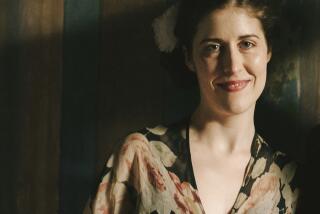Discoveries
Hope Will Find You
My Search for the Wisdom to Stop Waiting and Start Living
Naomi Levy
Harmony Books: 244 pp., $23
Naomi Levy, the first female Conservative rabbi to lead a congregation on the West Coast, was used to caring for other people in crisis. Above all, she noticed a tendency for them to live in the future — life would begin when they lost weight, fell in love, got divorced. In July 2001, Levy’s daughter Noa, then 5, was diagnosed with ataxia telangiectasia, a degenerative neurological disease with no cure. In anguish, Levy applied her considerable will to specialists, therapists, endless appointments. Her life fell to pieces around her. This is the story of seven years in the life of Levy and her family — son Adi, then 7, Noa and Levy’s husband, Robert Eshman. It is the story of her search for hope, her frustration with God, her awe in the face of her daughter’s wisdom and her realization that grace is stronger than will. You don’t have to try so hard, her daughter told her one day, “Hope will find you.” Thus armed, Levy is able to once again appreciate her daughter, as she is, and her family and her life. When she relaxes her grip on life, her appetite for it returns. The more details, the more honesty and, yes, the more a reader is dragged through the ups and downs (of a protracted crisis like Levy’s) the more helpful a book like this can be. There is the opportunity for perspective; friends come and go, friends get compassion fatigue, but a book, well, a good book like Levy’s can see you through, give a reason for hope.
City of Tranquil Light
A Novel
Bo Caldwell
Henry Holt: 284 pp., $25
“I am an ordinary man and an unlikely missionary.” And yet, Will, from the time of his boyhood in Oklahoma in the early 1900s, has a calling. “City of Tranquil Light” is the story of two young Mennonite missionaries, Will and Katherine, who go to the city of Kuang P’ing Ch’eng on the North China Plain, are given their own station and stay for 25 years. They start an orphanage; their own daughter is born and dies within a year; they are caught in the middle of a civil war and accused of spying. They’re witness to much injustice and come to believe their God is flawed, but their life together is suffused with love — a gentle, quiet and fierce bond that lasts until their return to Southern California, through Katherine’s death and beyond. (Bo Caldwell’s maternal grandparents were also missionaries in China in the early 1900s. This story is based in part on their lives.) When the novel opens, Will is 81, remembering their years together. One day, he reads a note his wife wrote on the inside of her Bible: “When we don’t feel hope, we wait for it, and it always comes.”
The Blindness of the Heart
Julia Franck, translated from the German by Anthea Bell
Grove Press: 424 pp., $24.95
Here is a novel about the absence of hope, a treatise on the number of times a single heart can be broken before it ceases to function. In 1945, a mother abandons her 7-year-old son on a train platform full of people fleeing from Germany to the West. “Her words were all used up long ago, she had neither bread nor an hour’s time for him, there was nothing of her left for the child.” She had been raped by soldiers in front of her son, Peter, already traumatized when his friend is blown up by a bomb as they run across a field. (Peter is left running with his friend’s hand still in his, all the way home.) The mother, Helene, has watched her own mother go crazy and her father come home from war in pieces. Her beloved is killed on the day he plans to propose. Too much. Helene goes in search of her sister, with whom she had the strongest physical (and sexual) relationship of her life. The novel shows how Helene’s heart was broken in stages and how she came to leave her child, a child who could barely let his mother out of his sight.
Salter Reynolds is a writer in Los Angeles.
More to Read
The biggest entertainment stories
Get our big stories about Hollywood, film, television, music, arts, culture and more right in your inbox as soon as they publish.
You may occasionally receive promotional content from the Los Angeles Times.










